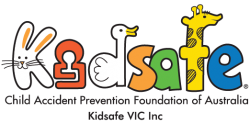An estimated 20 Australian children present to an emergency department every week with a button battery related injury.
Kidsafe Victoria supports calls for tougher safety regulations and a mandatory safety standard for products containing button batteries, in a bid to reduce the rates of serious childhood injury and death.
The call comes ahead of the release of the coronial inquest findings into the death of one-year-old Isabella ‘Bella’ Rees, who passed away in February 2015 after a button battery became lodged her oesophagus. The findings are due to be issued by the Coroner at 10am Thursday April 4th.
In Australia, button battery safety is only mandated for toys designed for children under the age of 3 years. These are legally required to have secured battery compartments. Other products are self-regulated by a voluntary industry code which calls for button battery compartments to be safely secured and for products with button batteries to have warning labels. However, recent investigations conducted by CHOICE showed that 10 out of the 17 products tested failed to meet the voluntary code, with the button batteries in the products being easily accessible.
Kidsafe Victoria supports:
- – A mandatory industry standard for button batteries
- – The introduction of a General Safety Provision
- – Proposed packaging amendments including mandatory child resistant packaging and single use packaging of retail batteries
- – An investment into the education regarding button batteries to new parents; every year in Victoria there are over 80,000 babies born, with 35,000 of these to new -families.
- – Parents, grandparents and other carers need to receive information about how to keep their babies safe
Jason Chambers, General Manager of Kidsafe Victoria, said, “Children under five years of age are at greatest risk and with so many common products using button batteries, one of the major dangers is that a small child can swallow a battery without anyone hearing, seeing or knowing.”
“If ingested, a button battery can become stuck in a child’s throat where saliva immediately triggers an electrical current which causes a chemical reaction that can burn the oesophagus in as little as two hours, causing severe life-threatening injuries and in some cases death.”
“These batteries are found in many common household items such as remote controls, calculators, bathroom scales, car keys, toys, watches, talking books/cards, hearing aids and flameless candles.”
Together with calls for tougher safety standards, Kidsafe Victoria is urging all parents, carers and family members to conduct regular button battery audits of areas in and around their homes and put in place measures to reduce the risk of children accessing and ingesting these batteries.
“Many products come with button batteries already installed. People may be surprised at just how many items in and around their homes contain them and could be posing a hazard to their children or children who visit their homes”, said Mr Chambers.
Button Battery Continuous Home Audit
- – Identify items with button batteries
- – Examine all devices and make sure the battery compartment is secure
- – Keep loose batteries and items with unsecured battery compartments locked away out of the sight and reach of children
- – Dispose of old button batteries immediately and safely – a flat button battery can still cause serious and life-threatening injuries if ingested
- – If you suspect a child may have swallowed a button battery, don’t wait for them to show symptoms, call the Poisons Information Centre on 13 11 26 (24 hours, 7 days a week) immediately for expert advice
- – Tell others about this threat and share these steps.
The symptoms caused by swallowing a button battery can look like other childhood illnesses and may include:
- – Chest pain
- – Coughing
- – Nausea/vomiting
- – Difficulty swallowing, or
- – Fever
Kidsafe Victoria’s ‘Button Battery Safety’ campaign provides a range of information, advice and resources for parents, carers, GP’s and hospital clinicians on the dangers posed by button batteries. More information can be accessed via https://www.kidsafevic.com.au/home-safety/button-batteries.
We acknowledge the Traditional Owners of country throughout Australia and recognise their continuing connection to land, waters and culture. We pay our respects to their Elders past, present and emerging.
Copyright Kidsafe Victoria© 2022 — Designed by Business Jump Co | PRIVACY POLICY | TERMS & CONDITIONS



